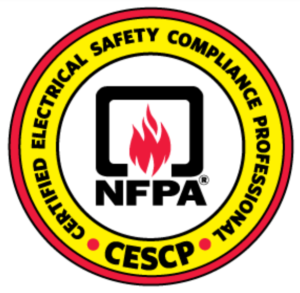Congratulations to Tom Kelly for completing his Certified Electrical Safety Compliance Professional designation. The National Fire Protection Agency (NFPA) program, CESCP, is designed to meet the needs of electrical and safety professionals who oversee electrical safety programs or who manage electricians and other personnel exposed to electrical hazards.
NFPA 70E outlines a four-step approach to electrical safety:
-
- TURN OFF THE POWER. Work de-energized, whenever possible. This isn’t always feasible. When it is working on or near exposed energized conductors and parts, NFPA 70E requires the following:
- LIVE WORK PERMIT. Have the customer sign an Energized Electrical Work Permit.
- PLAN THE WORK. Have a written plan for performing the energized work safely.
- USE PERSONAL PROTECTIVE EQUIPMENT (PPE). This includes flame-resistant (FR) clothing, insulated tools, face shields, and flash suit
The purpose of NFPA 70E®, Standard for Electrical Safety in the Workplace®, is to provide a working area for employees that is safe from unacceptable risk associated with the use of electricity in the workplace. NFPA 70E establishes safety processes that use policies, procedures, and program controls to reduce the risk associated with the use of electricity to an acceptable level. The CESCP certification showcases Tom’s knowledge and proficiency with the practices and concepts found in NFPA 70E, Standard for Electrical Safety in the Workplace.
NFPA 70E addresses employee workplace electrical safety requirements. The standard focuses on practical safeguards that also allow workers to be productive within their job functions.
Originally developed at OSHA’s request, NFPA 70E helps companies and employees avoid workplace injuries and fatalities due to shock, electrocution, arc flash, and arc blast, and assists in complying with OSHA 1910 Subpart S and OSHA 1926 Subpart K.
The core objective is practical, accomplishable electrical safety that results in the employee going home safe at the end of the day. The risk controls discussed in this standard are not impractical or unrealistic; they are sound, viable, workable applications of safety procedures and policies to be implemented by the employer and employee.
NFPA 70E-2004 is entitled Standard for Electrical Safety in the Workplace. It is related to the National Electrical Code (NFPA standard 70) as follows:
- The National Electrical Code (NEC) describes how to design and install electrical systems but not how to actually perform the work.
- NFPA 70E describes safe work practices for electrical construction and maintenance but not how to design or install electrical systems.
- The two documents (NEC and NFPA 70E) have identical scopes and many of the same definition. They both cover “inside” wiring in buildings and similar structures. Neither of them covers utility (line) construction.
Construction sites are workplaces. The NEC covers safety of electrical installations, and NFPA 70E covers electrical safety in workplaces. While it technically applies to all workplaces (libraries, schools, hospitals, supermarkets, law offices, etc.), NFPA 70E is enforced most often on construction sites and at industrial plants. Anywhere that electrical construction and maintenance work happen is a workplace.
Tom has a Bachelor of Science and a Master of Science in Electrical Engineering. Tom’s 30-year career in electrical engineering includes forensic engineering investigations involving industrial electrical accidents, electrical equipment failure analysis, control system failures, robotics and automation components, and scope of damage assessments. He has conducted investigations for fires, arc flash incidents, electrocution and electric shock accidents and lightning strike evaluations.




